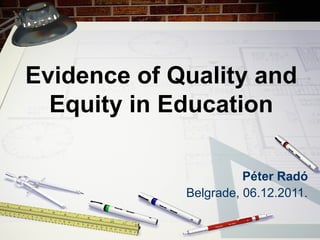
Péter Radó: Evidence of Quality and Equity in Education. Belgrade 2011
- 1. Evidence of Quality and Equity in Education Péter Radó Belgrade, 06.12.2011.
- 2. A sample evidence 1.
- 3. A sample evidence 2.
- 4. A sample evidence 3.
- 5. A sample evidence 4.
- 6. A few questions: (Assuming that these data are available ) • Is there a demand for these data among the key players of education? • Do you have access to the information allowing the interpretation of these data? What would it tell about the quality of educational services? • Do you have the capacity to transform the conclusions drawn from these data to actual design of policies and implementation strategies? • Can you imagine a minister of education explaining this statistical analysis in a 30 seconds TV interview? • Can you imagine convincing middle class parents about mixing their children with disadvantaged children on the basis of this analysis? • Can you imagine convincing teachers about forming heterogeneous classrooms instead of forming easily taught homogeneous classrooms? • Can you imagine municipalities reorganizing their local school systems in order to ensure equal distribution of disadvantaged students on the basis of this analysis?
- 7. Questions emerging from the questions 1. What can generate demand for evidence? 2. How to produce evidence? 3. How to determine quality and equity relevant evidence needs? 4. How to ensure the interpretation of evidence? 5. What are the traps to be avoided? 6. What is the best use of evidence? (Influencing the quality of the policy discourse.)
- 8. Generating demand for evidence From dumb centralization to intelligent post-bureaucratic governance
- 9. Generating demand for evidence: governance and management Making education a complex adaptive system by: • making schools autonomous learning organizations accountable for the quality of their services and the equity of their outcomes, • decentralization, deregulation, procedural regulation, • mandatory multilevel short- and medium term planning, • Intelligent professional accountability systems with strong focus on educational outcomes produced by whole schools, • ensuring the openness of decision making at all levels.
- 10. Generating demand for evidence: policy-making The normative approach to EBPM ↔ the very contextual nature of quality and equity → „Intelligent policy making” Learning by open deliberation: enrichment of reasoning with the tacit and practical knowledge of practitioners + evidence informing the actors of the policy discourse
- 11. Information production in education 1. Quality evaluation embedded to a performanace management system • Connecting goals/targets with quality evaluation instruments • Student performance assessment informing (external and internal) school evaluation • Connecting the pillars of by quality evaluation by an integrated indicator/reporting system • Strengthening accountability by intervention on the basis of quality evaluation information • Balancing accountability and organisational learning in schools
- 12. Information production in education 2. The only reliable measure of strengths and weaknesses is international comparison. → Enabling information systems for international referencing (EU OMC indicators and benchmark, OECD „Education at a glance” indicators, participation in international student achievement surveys, connecting internal and international assessment systems, etc.) → Ensuring the contextual relevance of international comparative information by further analysis and comparative research (See: European educational performance patterns)
- 13. Determining quality and equity related information needs Connecting the results of meta-evaluation with the instruments of quality evaluation The characteristics of effective schools General effectiveness enhancing factors · Achievement orientation and high expectations · Educational leadership · Consensus and cohesion among staff · Curriculum quality and opportunity to learn · School climate · Evaluative potential · Parental involvement · Classroom climate · Effective learning time · Structured instruction · Independent learning · Differentiation · Reinforcement and feedback Scheerens et alia. 2003.
- 14. Interpretation: research and communication • Research for deeper understanding: e.g. what makes heterogeneous schools more capable to compensate for disadvantages? • Typical problem: research substituting information production versus research for the interpretation of information produced on a regular basis. • Communication: transforming evidence to clear policy messages. → „Simplexity” (Ora Ito) E.g. „Children in schools with heterogeneous intake develop better.”
- 15. A few possible traps • The trap of measurement: what we measure becomes a problem, what we don’t measure remains invisible and ignored • „Economism”: considering the indicator equal with the indicated fact, policies aiming at „improving indicators” instead of solving problems • Growing complexity → the fear of loosing control → escaping from complexity by maintaining (or returning to) centralization created simplicity • Striving for the „optimum” instead of striving for the „possible” (ignoring power, influence, prejudice, whim, etc. by focusing only on evidence) • Evidence as legitimacy substitute
- 16. Finally… What determines the quality of the policy discourse: the technology and references of policy-making What has changed in Hungary between 2010 May and July? Politics, nothing else.
Notas do Editor
- The provision of evidence is only possible if there is a demand for evidence --- who are in demand and why? Centralized systems: all responsibility lies with the center, all decision are made by the center, the functions performed by the center is pure administration --- the center does not in need of too much information beyod administrative reporting --- centralized system are dumb (not the individuals, the system as such) ---- decentralized systems
